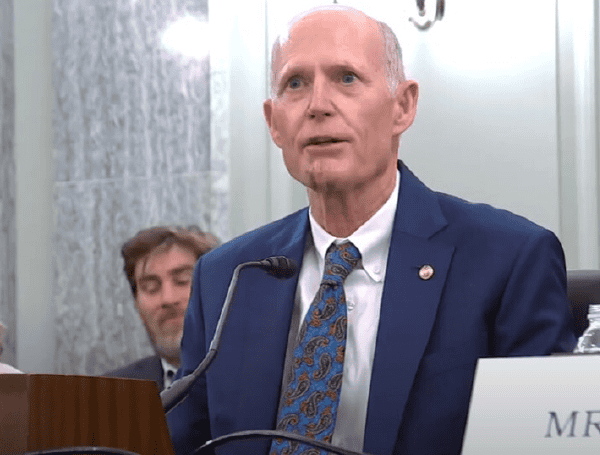A bipartisan group of U.S. Senators, including Senator Rick Scott, introduced legislation Wednesday to prevent U.S. tax dollars from being used to purchase transit buses and rail cars from manufacturers backed by the Chinese government.
The Safeguarding Transit Operations to Prohibit (STOP) China Act seeks to protect domestic transit systems and supply chains from what lawmakers describe as the Chinese Communist Party’s (CCP) “nefarious influence.”
Senators John Cornyn, Marsha Blackburn, Tammy Baldwin, Shelley Moore Capito, Gary Peters, Pete Ricketts, and Tina Smith joined Senator Scott in introducing the bill.
READ: Transparency Lawsuit Against Chicago Teachers Union Clears Hurdle As Judge Denies Dismissal
Congressmen Rick Crawford and John Garamendi are leading a companion version of the legislation in the House of Representatives.
The STOP China Act would specifically prohibit the U.S. Department of Transportation (DOT) from awarding grants that would fund the purchase of transit buses or rail cars from entities backed by the Chinese government.
“At every opportunity, the Chinese Communist Party works to exploit America and put our nation’s critical infrastructure at risk,” said Senator Scott. “We cannot allow an adversarial regime access to supply chains and transit that we rely on every day, and we definitely cannot allow U.S. tax dollars to fund any projects that allows such access. We must prioritize Americans’ safety, American jobs, and American manufacturing, and put an end to our dangerous dependence on a regime that openly seeks our downfall.”
According to the bill’s “Sense of Congress” section, the legislation is motivated by concerns that the People’s Republic of China (PRC) uses market-distorting industrial policies to gain dominance, posing a significant risk to U.S. national security and long-term competitiveness.
The senators say that the PRC intentionally creates overcapacity and sells products below market prices to undermine U.S. domestic supply chains and employs a military-civil fusion strategy that intrudes into the U.S. transportation market.
READ: Florida Sen. Scott Leads Senate Push For Permitting Transparency With New Bill
The bill states that U.S. taxpayer dollars should not fund PRC-subsidized vehicle manufacturing or technology companies. It seeks to prevent any entity receiving federal funding from procuring vehicles from a PRC entity or those containing certain vehicle technologies deemed a national security concern.
The STOP China Act proposes amendments to an existing law that currently restricts the use of public transportation funds to purchase rolling stock from certain manufacturers.
The new bill would expand and reinforce these prohibitions, applying them broadly to “covered vehicles” and “electric power trains” produced by “covered entities” from “covered nations.” While the definition of “covered nation” references another statute, the bill’s rationale heavily emphasizes the risks posed by the PRC.
Details of the bill include:
- Expanded Funding Prohibition: Prohibits the use of funds under Chapter 53 of Title 49 (primarily public transportation programs) and other Department of Transportation appropriations for the procurement of covered vehicles.
- Technology Focus: Includes a prohibition on vehicles that incorporate problematic “electric power trains” produced by covered entities, alongside the restriction on vehicles produced by covered entities themselves.
- Infrastructure Restriction: Also prohibits the use of specified federal funds for the construction, installation, or maintenance of fueling or charging infrastructure for covered buses procured after the bill’s enactment date.
- Public List: Requires the United States Trade Representative, in consultation with the Attorney General and the Secretary of Transportation, to create and publicly maintain a list of covered entities subject to the prohibition. This list is mandated to be updated frequently, especially in the initial period after enactment.
- Limited Exception: Includes an exception allowing the procurement of covered vehicles or related infrastructure solely for purposes of inspection, investigation, or motor vehicle safety research, development, or testing.
“It is China’s mission to infiltrate and dominate every aspect of American society, including our transit systems, and we cannot let them succeed,” said Senator Cornyn. “By preventing American tax dollars from being used to purchase Chinese government transit buses or rail cars, our legislation would help protect U.S. transportation infrastructure from the CCP.”
Senator Marsha Blackburn highlighted the need to prevent the use of taxpayer funds to benefit Chinese state-backed entities.
“China’s attempts to exploit critical American infrastructure with taxpayer funds will not be tolerated,” said Senator Blackburn. “The STOP China Act would prevent hard-earned American dollars from purchasing Chinese-made vehicles in our transit infrastructure, protecting our national security and supporting American manufacturing.”
The legislation has garnered support from several prominent industry and labor organizations, including the Alliance for American Manufacturing, Steel Manufacturers Association, International Brotherhood of Teamsters, United Steelworkers, International Association of Machinists and Aerospace Workers, and Transport Workers Union of America.
Please make a small donation to the Tampa Free Press to help sustain independent journalism. Your contribution enables us to continue delivering high-quality, local, and national news coverage.
Connect with us: Follow the Tampa Free Press on Facebook and Twitter for breaking news and updates.
Sign up: Subscribe to our free newsletter for a curated selection of top stories delivered straight to your inbox.
